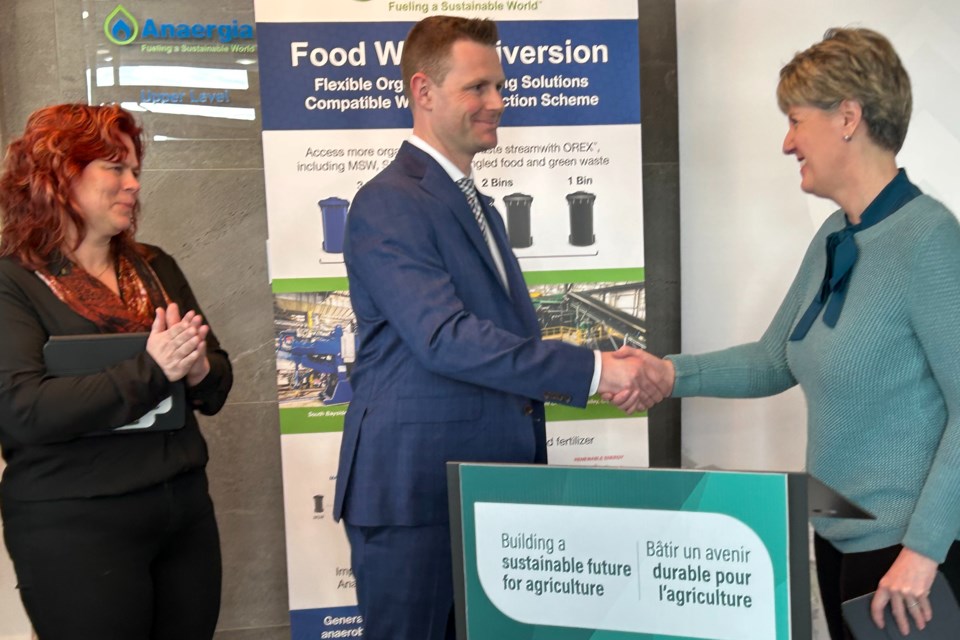Each week, thousands of household green bins line local streets, filled to the brim with compostable material. But where does it go from there?
Anaergia Inc. has spent a lot of time thinking about that very question — and this month received a $1.7-million boost from the federal government to develop and improve the technologies needed to process source separated organics (SSO) and make them into feed and fertilizer products for agricultural use.
The company, a world leader in anaerobic digestion technologies, hosted Minister of Agriculture and Agri-Food Canada Marie-Claude Bibeau at its global headquarters on the South Service Road on March 2. The announcement was part of a $24.1-million commitment through the Agricultural Clean Technology Program (ACT) for 55 projects focused on the adoption of clean technologies in Ontario. This investment brings the province-wide total to more than $39 million supporting 97 ACT projects to date.
Anaergia received the support for two projects they are working on to advance technologies to convert food waste to carbon negative fuel. Specifically, the ACT funding will enable the company to advance two technologies for processing SSO into a clean digestible slurry that is manageable at any on-farm regulated mixed anaerobic digester facility in Canada.
As SSO collected at the curbside is inevitably contaminated with plastics and other substances, it must be mechanically processed to eliminate the materials to make it suitable for anaerobic digestion on farms. Anaergia plans to make that processing equipment as effective and efficient as possible.
Diverting SSO prevents the methane emissions that occur when this waste breaks down in landfills and allows it to be converted to renewable fuel via anaerobic digestion. The waste can be combined with agricultural waste at farms to enable more farmers to create renewable energy.
Because many farms in Canada do not by themselves produce enough waste for anaerobic digestion, the addition of processed SSO would create enough material to allow for anaerobic digestion on site.
“Our goal is to help Canadian producers innovate and adopt clean technologies,” said Bibeau. “It’s great to see this project underway here at the Burlington facility. These technologies offer great potential for the growing number of Ontario farmers who have on-farm bio-digesters that can turn farm residues and waste into renewable fuels and fertilizers.”
Sasha Rollings Scattergood, VP of technologies at Anaergia, pointed out that Canada produces roughly 3.5 million tonnes of SSO per year, with about 1.3 million tonnes produced in Ontario.
“Without municipal SSO programs, consumer food waste often ends up in a landfill where it emits methane, a potent greenhouse gas which traps 84 times more heat than carbon dioxide,” he said.
Scattergood explained that the recent acceptance of SSO as eligible feedstock that can be used in on-farm anaerobic digestion facilities makes on-farm digesters an option for farms to process SSO and add new revenue streams, while returning high-value nutrients to their land.
“The benefits don’t stop at the bottom line,” he said, citing a myriad of environmental benefits. “A single on-farm digester will be capable of reducing nearly 12,000 tonnes per year of CO2 emissions, equivalent to removing more than 2,500 passenger vehicles from the road. There are currently 45 on-farm digesters across Canada that will be able to make use of this development immediately and hundreds will be able to, thereafter.”
Over the next two years, Anaergia will use the funding to advance two pieces of processing equipment for the pretreatment and polishing of SSO collected from Canadian households. The goal is to make the equipment more efficient and more affordable, and enable it to produce a quality feedstock.
OFA President Peggy Brekfeld, who operates a family dairy farm in northern Ontario, applauded the investment.
“Climate change is a global challenge requiring action and investment from governments and partners with farmers and the agricultural industry as a whole,” she said. “As we work towards reducing our environmental footprint and prioritizing the adoption of sustainable farming practices, we want to be doing it in a way that protects and supports farmers and protects and supports our food supply throughout this transition.”
Brekfeld added that partnerships between the government, farmers and agri-businesses are crucial for paving the way for farming in the future.
“With more priority given to innovation and adoptions of clean technologies that benefit the environment, Canadians can be confident that the food being grown here in Ontario and throughout Canada is being done in a way that minimizes environmental impact,” she said.
Anaergia Chairman and CEO Dr. Andrew Benedek also welcomed the announcement. “This ACT funding will support the technologies that transform waste into carbon-negative renewable fuel,” he said. “These technologies are crucial for reducing emissions of methane, an extremely potent greenhouse gas. We are grateful that the Government of Canada is supporting these solutions and Anaergia’s mission to accelerate the world’s clean energy transition.”



